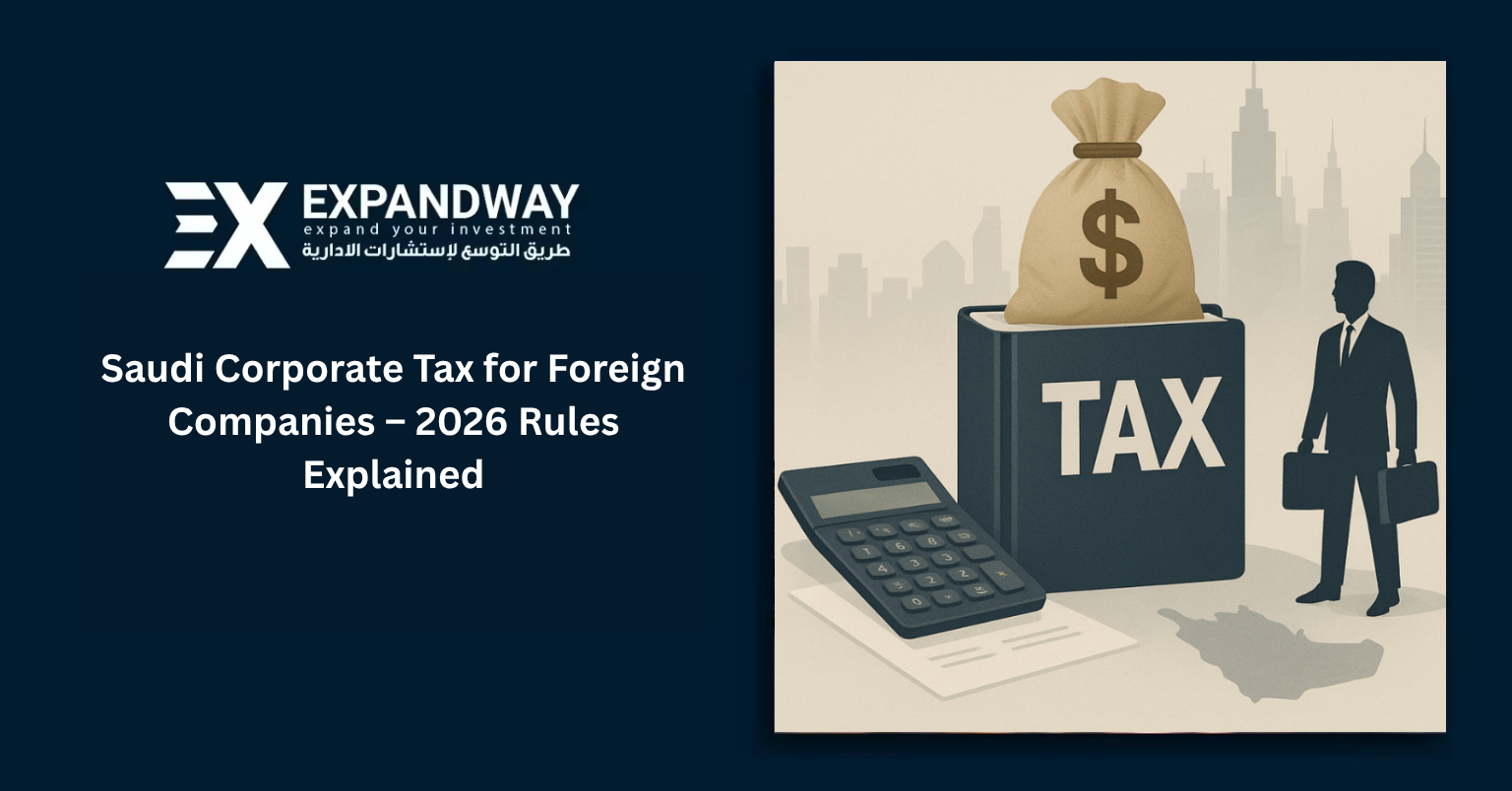Introduction
Saudi corporate tax foreign regulations are becoming increasingly important for international investors entering the Kingdom in 2026. With major reforms under Vision 2030, foreign companies must understand how the 20% corporate tax, Zakat rules, Permanent Establishment requirements, and compliance deadlines work to operate legally and profitably in Saudi Arabia.
Saudi Corporate Tax System for 2026: Key Highlights
Saudi Arabia follows a dual tax model, applying different rules to foreign and local/GCC investors.
Here are the main 2026 updates:
- 20% Corporate Income Tax (CIT) applies to foreign-owned companies.
- Only Saudi-source income is taxable.
- Saudi & GCC nationals pay 2.5% Zakat, instead of corporate tax.
- Mixed-ownership companies pay both (proportionately).
- Filing deadline: within 120 days of the fiscal year-end.
- Penalties can reach 25% for non-compliance.
- Some industries (oil, hydrocarbons) face 50–80% higher tax rates.
- Profit repatriation is allowed after compliance.
Understanding the Dual Tax System in Saudi Arabia
Saudi Arabia does not apply a single tax model to all investors. Instead, it divides liabilities based on ownership structure and residency.
1. Corporate Income Tax (CIT) – 20% for Foreign Investors
Foreign-owned companies or branches are taxed at:
👉 20% of net adjusted profits
This applies to:
- Wholly foreign-owned companies
- Foreign partners in joint ventures
- Non-resident companies with PE in Saudi Arabia
- Entities earning income through services, contracts, or projects inside KSA
Allowable Deductions Under Saudi Tax Law
Before applying the 20% tax, companies can deduct all standard business expenses:
- Employee salaries and benefits
- Rent and utilities
- Depreciation of assets
- Marketing and administrative expenses
- Professional services
- Cost of goods sold
- Financing expenses (within limits)
These deductions significantly reduce taxable profit.
2. Zakat – 2.5% for Saudi & GCC Shareholders
Saudi and GCC partners do NOT pay corporate tax.
Instead, they pay 2.5% Zakat calculated on:
- Owner’s equity
- Working capital
- Retained earnings
- Certain balance sheet items
Example of Mixed Ownership
If a company is:
- 60% Saudi-owned → Zakat
- 40% Foreign-owned → 20% corporate tax
Both taxes are calculated separately.
Permanent Establishment (PE) Rules in 2026
A foreign company is considered to have a Permanent Establishment (PE) in KSA when it has:
✔ Physical presence
- Branch
- Office
- Workshop
- Construction site
- Warehouse
✔ Dependent agent
Someone in KSA who habitually concludes contracts on your behalf.
✔ Service PE
Providing services in the Kingdom for a certain duration.
Once PE is established → 20% tax becomes mandatory.
Corporate Tax Deadlines & Compliance (2026)
1. Tax Filing Deadline
- File returns within 120 days from the fiscal year-end.
2. Payment Deadlines
- Corporate tax must be paid before or at filing.
3. Required Submissions
- Tax or Zakat return
- Audited financial statements
- Transfer pricing documentation (for multinational groups)
- Withholding tax reports (if applicable)
Penalties for Non-Compliance
Saudi Arabia enforces strict tax compliance. Penalties include:
| Violation | Penalty |
| Late filing | Up to 25% of tax due |
| Underreporting | Additional fines |
| Late payment | Daily interest/penalty |
| Operating without registration | Heavy fines + license complications |
Foreign investors must manage filings carefully to avoid disruptions.
Profit Repatriation Rules in 2026
Saudi Arabia allows foreign companies to freely transfer profits abroad, provided:
- All taxes are paid
- No outstanding penalties exist
- Financials are properly documented
- ZATCA filings are complete
Are dividends taxed?
Dividend taxation depends on double-tax treaties. In many cases, withholding tax applies, but treaties reduce or eliminate it.
This clear repatriation system makes Saudi Arabia highly attractive for global investors.
Special Industry Tax Rates (50–80%)
Certain industries especially government-controlled strategic sectors face elevated tax rates:
- Oil & Gas companies
- Hydrocarbon exploration & production
- Refining and major petrochemical complexes
Rates range from 50% to 80%, depending on profitability and business nature.
These do NOT apply to general foreign investors.
Who Must Pay Corporate Tax in Saudi Arabia?
You must pay 20% corporate tax if your company:
- Is fully foreign-owned
- Is a foreign partner in a Saudi joint venture
- Operates through a PE
- Performs professional services inside KSA
- Derives income from Saudi customers
- Signs projects or contracts within the Kingdom
If you are Saudi or GCC-owned → Zakat only.
Worked Example – Easy Understanding
Total profit: 1,000,000 SAR
Ownership: 40% foreign, 60% Saudi
Foreign Share (40%)
400,000 × 20% = 80,000 SAR corporate tax
Saudi Share (60%)
Zakat = 2.5% on Zakat base (approx = equity/equivalent)
2026 Trends Impacting Foreign Investors
1. Stricter PE monitoring
More checks on foreign companies operating informally.
2. Mandatory digital filings
ZATCA is pushing for electronic submissions and automated audits.
3. Introduction of sector-based levies
New excise taxes and regulatory fees for certain industries.
4. Greater transparency & compliance requirements
Foreign companies must maintain strong documentation systems.
Suggested Internal Links for WordPress
(Add during publishing)
- /business-setup-in-saudi-arabia
- /saudi-investor-license-guide
- /saudi-misa-license-requirements
- /how-to-open-branch-in-saudi-arabia
Suggested External Links
- ZATCA official portal
- Ministry of Investment (MISA)
- Saudi Companies Law
- Saudi investment regulations (Vision 2030)
Image Alt Text Suggestions
- “Saudi corporate tax rules 2026 for foreign companies”
- “Corporate tax vs Zakat comparison chart Saudi Arabia”
- “Saudi Arabia 20% corporate income tax explanation”
- “Foreign investor tax compliance Saudi Arabia 2026”
Conclusion
Saudi Arabia’s 2026 tax structure is designed to provide clarity, fairness, and a business-friendly environment for foreign investors. With a clear 20% corporate tax, 2.5% Zakat for locals, structured profit repatriation, and defined PE rules, the Kingdom offers transparency and long-term stability.
Foreign companies that understand these obligations can operate confidently, avoid penalties, and maximize their investment returns in one of the world’s fastest-growing markets.
Call to Action
Ready to expand your business into Saudi Arabia?
👉 Book a consultation with our Saudi business setup experts today and ensure full compliance with 2026 tax regulations

